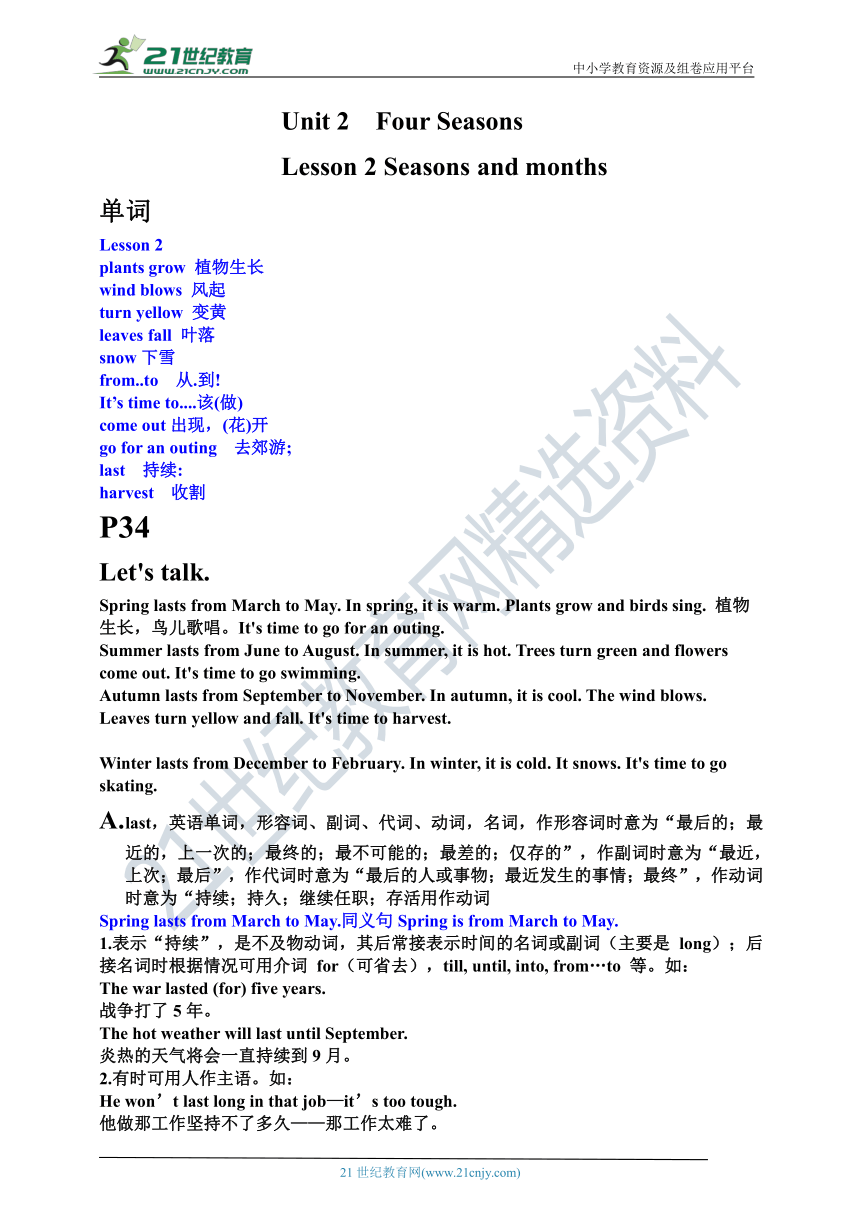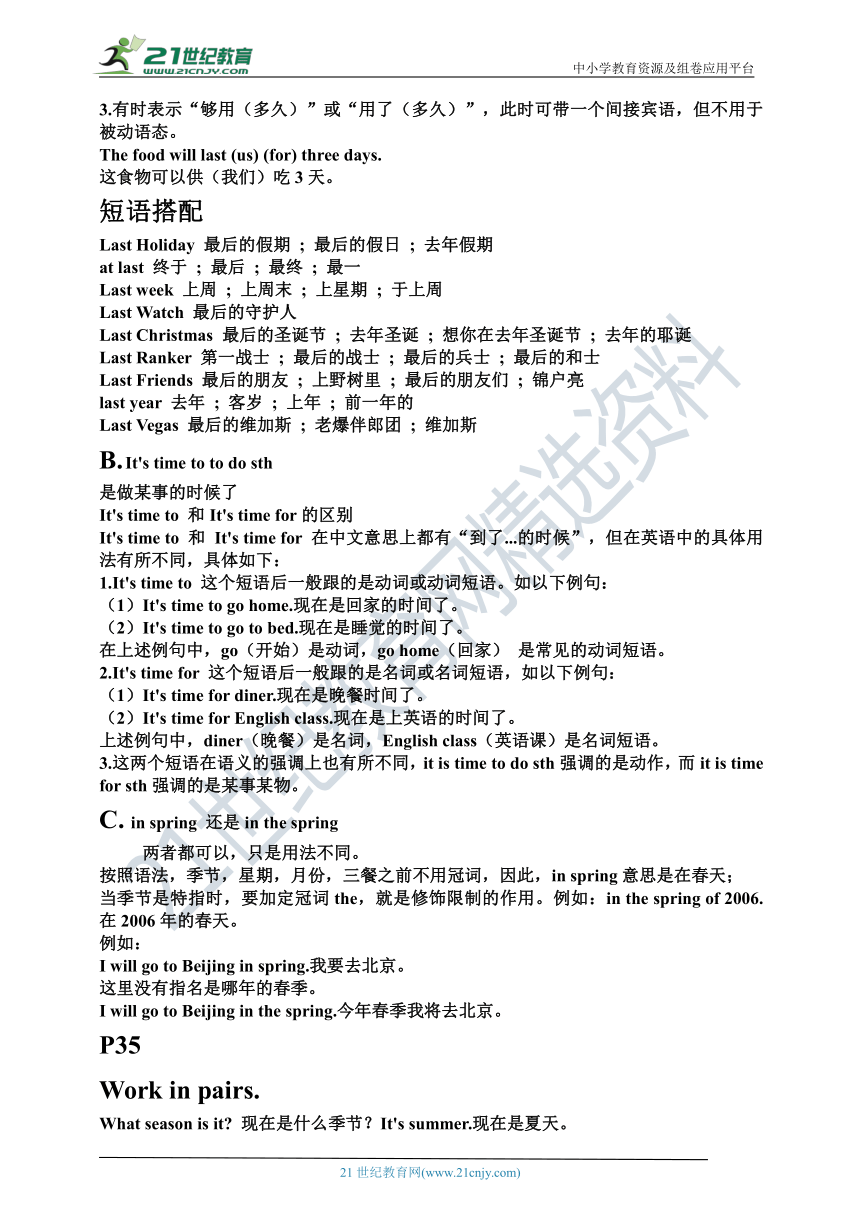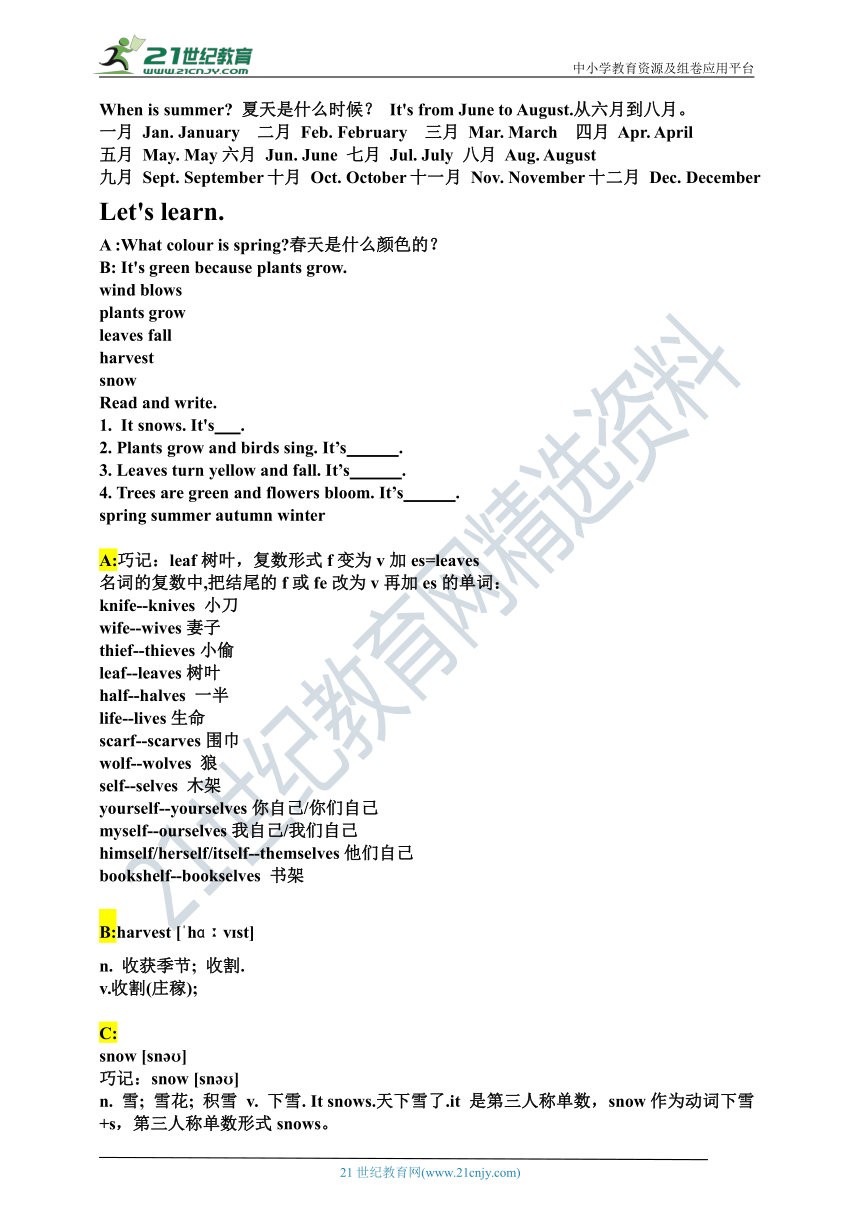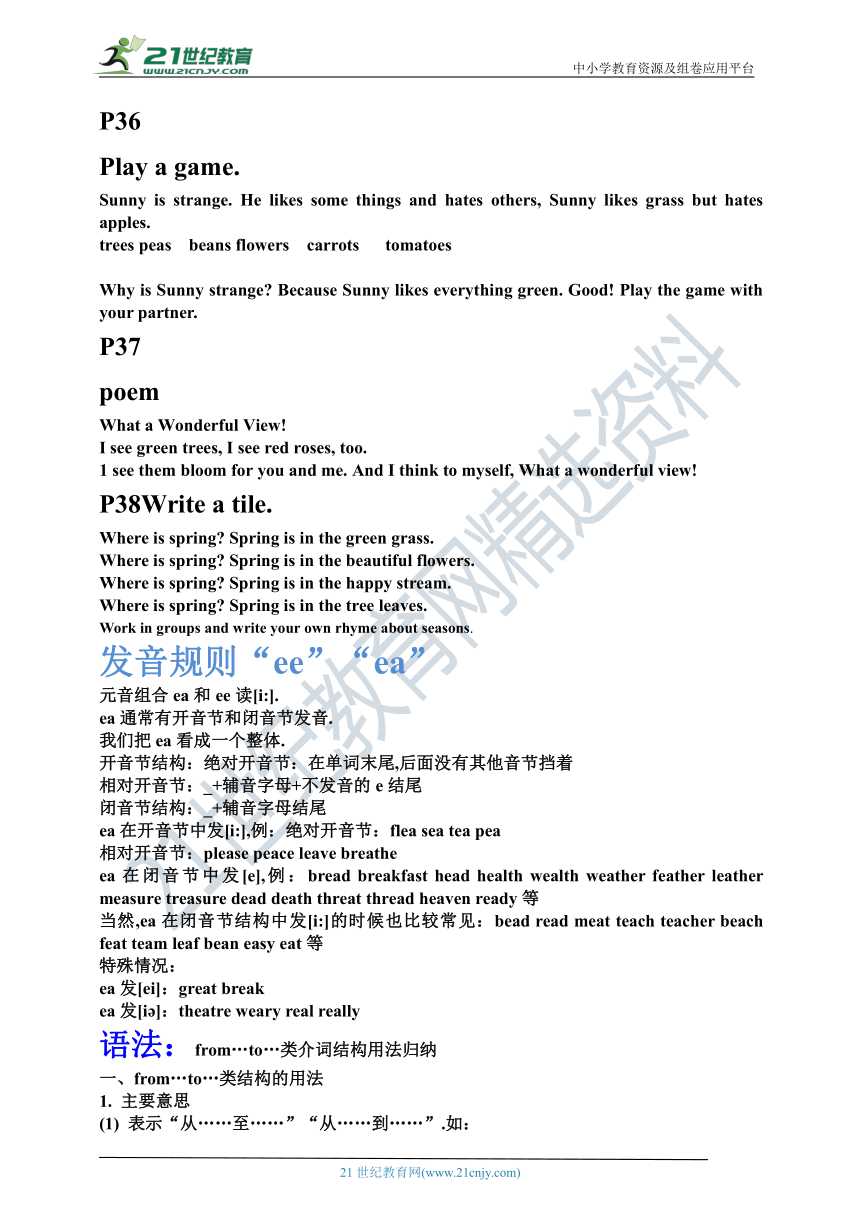Unit 2 Lesson 2 Seasons and months 知识汇总(单词+句型+语法)
文档属性
| 名称 | Unit 2 Lesson 2 Seasons and months 知识汇总(单词+句型+语法) |

|
|
| 格式 | zip | ||
| 文件大小 | 178.0KB | ||
| 资源类型 | 试卷 | ||
| 版本资源 | 川教版 | ||
| 科目 | 英语 | ||
| 更新时间 | 2020-03-04 00:00:00 | ||
图片预览




文档简介
中小学教育资源及组卷应用平台
Unit 2 Four Seasons
Lesson 2 Seasons and months
单词
Lesson 2
plants grow 植物生长
wind blows 风起
turn yellow 变黄
leaves fall 叶落
snow下雪
from..to 从.到!
It’s time to....该(做)
come out出现,(花)开
go for an outing 去郊游;
last 持续:
harvest 收割
P34
Let's talk.
Spring lasts from March to May. In spring, it is warm. Plants grow and birds sing. 植物生长,鸟儿歌唱。It's time to go for an outing.
Summer lasts from June to August. In summer, it is hot. Trees turn green and flowers come out. It's time to go swimming.
Autumn lasts from September to November. In autumn, it is cool. The wind blows. Leaves turn yellow and fall. It's time to harvest.
Winter lasts from December to February. In winter, it is cold. It snows. It's time to go skating.
A. last,英语单词,形容词、副词、代词、动词,名词,作形容词时意为“最后的;最近的,上一次的;最终的;最不可能的;最差的;仅存的”,作副词时意为“最近,上次;最后”,作代词时意为“最后的人或事物;最近发生的事情;最终”,作动词时意为“持续;持久;继续任职;存活用作动词
Spring lasts from March to May.同义句Spring is from March to May.
1.表示“持续”,是不及物动词,其后常接表示时间的名词或副词(主要是 long);后接名词时根据情况可用介词 for(可省去),till, until, into, from…to 等。如:
The war lasted (for) five years.
战争打了5年。
The hot weather will last until September.
炎热的天气将会一直持续到9月。
2.有时可用人作主语。如:
He won’t last long in that job—it’s too tough.
他做那工作坚持不了多久——那工作太难了。
3.有时表示“够用(多久)”或“用了(多久)”,此时可带一个间接宾语,但不用于被动语态。
The food will last (us) (for) three days.
这食物可以供(我们)吃3天。
短语搭配
Last Holiday 最后的假期 ; 最后的假日 ; 去年假期
at last 终于 ; 最后 ; 最终 ; 最一
Last week 上周 ; 上周末 ; 上星期 ; 于上周
Last Watch 最后的守护人
Last Christmas 最后的圣诞节 ; 去年圣诞 ; 想你在去年圣诞节 ; 去年的耶诞
Last Ranker 第一战士 ; 最后的战士 ; 最后的兵士 ; 最后的和士
Last Friends 最后的朋友 ; 上野树里 ; 最后的朋友们 ; 锦户亮
last year 去年 ; 客岁 ; 上年 ; 前一年的
Last Vegas 最后的维加斯 ; 老爆伴郎团 ; 维加斯
B. It's time to to do sth
是做某事的时候了
It's time to 和It's time for的区别
It's time to 和 It's time for 在中文意思上都有“到了...的时候”,但在英语中的具体用法有所不同,具体如下:
1.It's time to 这个短语后一般跟的是动词或动词短语。如以下例句:
(1)It's time to go home.现在是回家的时间了。
(2)It's time to go to bed.现在是睡觉的时间了。
在上述例句中,go(开始)是动词,go home(回家) 是常见的动词短语。
2.It's time for 这个短语后一般跟的是名词或名词短语,如以下例句:
(1)It's time for diner.现在是晚餐时间了。
(2)It's time for English class.现在是上英语的时间了。
上述例句中,diner(晚餐)是名词,English class(英语课)是名词短语。
3.这两个短语在语义的强调上也有所不同,it is time to do sth强调的是动作,而it is time for sth强调的是某事某物。
C. in spring 还是in the spring
两者都可以,只是用法不同。
按照语法,季节,星期,月份,三餐之前不用冠词,因此,in spring意思是在春天;
当季节是特指时,要加定冠词the,就是修饰限制的作用。例如:in the spring of 2006.在2006年的春天。
例如:
I will go to Beijing in spring.我要去北京。
这里没有指名是哪年的春季。
I will go to Beijing in the spring.今年春季我将去北京。
P35
Work in pairs.
What season is it? 现在是什么季节?It's summer.现在是夏天。
When is summer? 夏天是什么时候? It's from June to August.从六月到八月。
一月 Jan. January 二月 Feb. February 三月 Mar. March 四月 Apr. April
五月 May. May六月 Jun. June 七月 Jul. July 八月 Aug. August
九月 Sept. September十月 Oct. October十一月 Nov. November十二月 Dec. December
Let's learn.
A :What colour is spring?春天是什么颜色的?
B: It's green because plants grow.
wind blows
plants grow
leaves fall
harvest
snow
Read and write.
1. It snows. It's .
2. Plants grow and birds sing. It’s .
3. Leaves turn yellow and fall. It’s .
4. Trees are green and flowers bloom. It’s .
spring summer autumn winter
A:巧记:leaf树叶,复数形式f变为v加es=leaves
名词的复数中,把结尾的f或fe改为v再加es的单词:
knife--knives 小刀
wife--wives妻子
thief--thieves小偷
leaf--leaves树叶
half--halves 一半
life--lives生命
scarf--scarves围巾
wolf--wolves 狼
self--selves 木架
yourself--yourselves你自己/你们自己
myself--ourselves我自己/我们自己
himself/herself/itself--themselves他们自己
bookshelf--bookselves 书架
B:harvest [?hɑ?v?st]
n. 收获季节; 收割.
v.收割(庄稼);
C:
snow [sn??]
巧记:snow [sn??]
n. 雪; 雪花; 积雪 v. 下雪. It snows.天下雪了.it 是第三人称单数,snow作为动词下雪+s,第三人称单数形式snows。
P36
Play a game.
Sunny is strange. He likes some things and hates others, Sunny likes grass but hates apples.
trees peas beans flowers carrots tomatoes
Why is Sunny strange? Because Sunny likes everything green. Good! Play the game with your partner.
P37
poem
What a Wonderful View!
I see green trees, I see red roses, too.
1 see them bloom for you and me. And I think to myself, What a wonderful view!
P38Write a tile.
Where is spring? Spring is in the green grass.
Where is spring? Spring is in the beautiful flowers.
Where is spring? Spring is in the happy stream.
Where is spring? Spring is in the tree leaves.
Work in groups and write your own rhyme about seasons.
发音规则“ee”“ea”
元音组合ea和ee读[i:].
ea通常有开音节和闭音节发音.
我们把ea看成一个整体.
开音节结构:绝对开音节:在单词末尾,后面没有其他音节挡着
相对开音节:_+辅音字母+不发音的e结尾
闭音节结构:_+辅音字母结尾
ea在开音节中发[i:],例:绝对开音节:flea sea tea pea
相对开音节:please peace leave breathe
ea在闭音节中发[e],例:bread breakfast head health wealth weather feather leather measure treasure dead death threat thread heaven ready等
当然,ea在闭音节结构中发[i:]的时候也比较常见:bead read meat teach teacher beach feat team leaf bean easy eat等
特殊情况:
ea发[ei]:great break
ea发[i?]:theatre weary real really
语法:from…to…类介词结构用法归纳
一、from…to…类结构的用法
1. 主要意思
(1) 表示“从……至……”“从……到……”.如:
How far is it from your office to the bank? 从你办公室到银行有多远?
We are removing from London to the country. 我们正从伦敦迁往乡下.
(2) 表示“由……变成……”“将……改为……”.如:
He has moved from acting to film production. 他由演员变成了制片人.
She’s from a student to a worker. 她从学生变为工人.
(3) 表示“从一个……到另一个……”“一个……一个地”“逐个……”“挨个……”.如:
These people go from house to house selling goods. 这些人挨家挨户兜售货物.
He went from village to village, seeking for work. 他从一个村子到另一个村子,找寻工作.
I like to hop from channel to channel when I watch TV. 我看电视时喜欢不断地换频道.
The smaller animals can easily leap from tree to tree. 身体较小的动物可以在树丛间轻巧地跳来跳去.
2. 主要句法功能
(1) 用作表语
Lunch is from eleven to two. 从十一点到两点开午饭.
Office hours are from 9 am to 5 pm. 办公时间从上午9点到下午5点.
The price range is from $100 to $500. 价格在100美元至500美元之间不等.
In Britain the long vacation is from June to October. 在英国,长的假期是从六月到十月.
The annual range of temperature is from –10℃ to 40℃. 全年的温度较差为零下10度至40度.
(2) 用作状语
She went straight from school to university. 她中学一毕业就马上进了大学.
I work from Tuesday to Saturday, and Sunday and Monday are my days off. 我从星期二到星期六工作,星期日和星期一休息.
(3) 用作定语
通常用于名词后作定语.如:
The transition from boyhood to manhood can be a confusing period. 从少年时期向成年时期的转变常是令人困惑的时期.
但有时from…to…结构用于名词前起修饰作用,此时通常可视为from…后(也就介词to之前)省略了一个名词.如:
Water passes from a liquid to a solid state when it freezes. 水结冰是由液态变为固态.(可视为liquid的后面省略了state)
Could you cut your essay from 10,000 to 5,000 words? 请把你的那篇文章从10,000字删减到5,000字行吗?(可视为10,000的后面省略了words)
3. 连用名词时是否用冠词
当from…to…用于连接两个名词时,有时名词前需带有冠词,有时不用,情形比较复杂,大致遵循的原则如下:
(1) 若所搭配的名词意思比较具体,是在谈论特定场合的具体人或事物,则通常要用冠词.如:
The book fell from the table to the floor. 书从桌上掉到地板上.
The scene cuts from the shop to the street. 镜头从商店转换到街道.
A bus transported us from the airport to the city. 一辆公共汽车把我们从机场送到市区.
(2) 若所搭配的名词意思比较抽象,只是在谈论一般概念或一般规律等,则不用冠词.比较:
This skill wasn’t handed down from the father to the son. 这项技术并没有从父亲传给儿子.
These skills used to be handed down from father to son. 这些技术以往都是父子相传.
It is not far from the house he lived in to the house I lived in. 从他居住的房子到我居住的房子并不远.
She went from house to house asking if anyone had seen the child. 她一家家去问是否有人见过这个小孩子.
(3) 但有时用不用冠词,与说话人的侧重点有关.比较并体会:
Then we transferred from a bus to a tram. 然后我们从公共汽车换成电车.
This is where we change from car to bus. 这就是我们从小汽车换乘公共汽车的地方.
(4) 在由from…to…构成的习语中,名词前通常是不用冠词的(见后面有关习语的用法归纳).如:
He works from dawn till dusk. 他从天亮工作到天黑.
From time to time I still think of her. 我仍然不时地想起她.
He knows the subject from beginning to end. 这个专题他了如指掌.
The children were covered in mud from head to toe. 孩子们全身沾满了污泥.
She went from house to house asking if anyone had seen the child. 她一家家去问是否有人见过这个小孩子.
但也有些习语,用不用冠词均可以,如from (the) cradle to (the) grave(一辈子,从生到死).如:
From (the) cradle to (the) grave, the car marks every rite of American passage. 在美国人的一生中,每一个重要阶段都有汽车的影子.
4. 关于与动名词的搭配
from…to…结构除通常与名词、代词、数词等搭配外,有时还可与动名词搭配.如:
He made a switch from publishing to teaching. 他由出版工作改做教学工作.
We are trying to shift the emphasis from curing illness to preventing it. 我们正在努力把工作重点从治疗疾病转为预防疾病.
He’s changed from being cynical about politics to being very interested in it. 他改变了对政治怀悲观的态度,而对其颇感兴趣.
注意,以下句子中的from…to…结构中,to为不定式符号,用于构成不定式表示结果或目的等.如:
She rose from her seat to protest. 她从座位上站起来提出抗议.
He rose from the ranks to become an officer. 他由士兵升为军官.
He dived from the bridge to rescue the drowning child. 他从桥上跳入水中去抢救那溺水儿童.
People came from far and near to hear the famous violinist. 人们从四面八方赶来听这位著名小提琴家的演奏.
5. 与动词vary, range等搭配
from…to…还经常与range, vary等表示“变化”“变动”的动词搭配使用,表示变化或变动的范围.如:
Dress sizes range from petite to extra-large. 服装尺码从特小号到特大号不等.
His interests ranged from chess to canoeing. 他的爱好从下国际象棋到划独木舟,范围很广.
These fish vary in weight from 3 kg to 5 kg. 这些鱼的重量从3公斤到5公斤不等.
The heights of the plants vary from 8 cm to 20 cm. 这些植物的高度从8厘米到20厘米不等.
Her mood varied from optimism to extreme depression. 她的情绪由乐观一变而为极度消沉.
值得一提的是,from…to…与动词vary搭配使用时,其中的from…to…还经常用于连接两个相同的名词,强调变化或差异.如:
The weather varies from day to day. 天气一天天变化.
Test scores vary from school to school. 测试成绩各校不同.
Prices vary widely from shop to shop. 价格各个商店大不一样.
The treatment will vary from patient to patient. 治疗方法因人而异.
Levels of unemployment vary from region to region. 失业情形各地不同.
Social customs vary greatly from country to country. 社会习俗各国差别很大.
Medical treatment varies greatly from state to state. 医疗制度各州大不同一样.
The symptoms she suffered varied from month to month. 她的症状每个月都不同.
Office hours vary from company to company and country to country. 因公司、国家不同,办公时间也有所不同.
【注】lurch from one crisis / extreme etc to another: also lurch from crisis to crisis
比较以下相似表达:
Salary scales vary between states. 工资高低各州不同.
Salary scales vary from state to state. 工资高低一个州与另一州不同.
Salary scales vary according to state. 工资高低视所在的州有报不同.
Salary scales vary with each state. 工资高低各个州不同.
6. 用于 from one…to…结构
from one…to another
主要用于谈论三者或三者以上的情况,大意为“从一个……到另一个……”,具体翻译时需视句子语境而定.如:
She skipped from one subject to another. 她讲得没有条理,东拉西扯.
She spends the day rushing from one meeting to another. 她成天在会场之间奔波.
There are no mechanisms for transferring funds from one department to another. 基金无法从一部门转移至另一部门.
【注】该结构有时也可用于指谈论两者的情况,如下面一句摘自《朗文当代高级英语辞典》第4版的shift词条:
Joe listened, shifting uncomfortably from one foot to another. 乔听着,不安地把重心从一只脚转移到另一只脚.
from one…to the other
主要用于谈论两者的情况,意思是“从(两者中的)一个……到另一个……”.如:
The two cultures were so utterly disparate that she found it hard to adapt from one to the other. 两种文化迥然不同,她发现很难用一种去适应另一种.
from one…to the next
与from one…to another用法相惟,也主要用于谈论三者或三者以上的情况,表示“从一个……到下一个……”,具体翻译时需视句子语境而定.如:
His moods swung wildly from one day to the next. 他的情绪天天起伏很大.
You don’t know what his mood will be from one day to the next. 真说不上他的情绪今天怎样明天又怎样.
I couldn’t understand his lecture because he kept jumping from one topic to the next. 我听不懂他的演讲,他总是从一项内容跳到另一项内容.
Statistical anomalies can make it difficult to compare economic data from one year to the next. 统计数字的不规则,会使某一年的经济资料很难与下一年相比较.
7. 用于某些习惯搭配
from beginning to end 从头到尾
I’ve read the book from beginning to end. 我把这本书从头到尾看完了.
The argument was shallow from beginning to end. 那次辩论从头到尾都很肤浅.
from bad to worse 越来越糟
Things are going from bad to worse. 事态越来越糟了.
His business is going from bad to worse. 他的生意每况愈下.
from cover to cover 从头至尾地
21世纪教育网 www.21cnjy.com 精品试卷·第 2 页 (共 2 页)
HYPERLINK "http://21世纪教育网(www.21cnjy.com)
" 21世纪教育网(www.21cnjy.com)
同课章节目录
- Unit 1 We love nature
- Lesson 1 Planting trees
- Lesson 2 Talking about squirrels
- Lesson 3 A book about animals
- Self-assessment
- Unit 2 Four seasons
- Lesson 1 Seasons and clothes
- Lesson 2 Seasons and months
- Lesson 3 Seasons and culture
- Self-assessment
- Unit 3 A birthday party
- Lesson 1 Coming to my party
- Lesson 2 Buying a present
- Lesson 3 Having a birthday party
- Self-assessment
